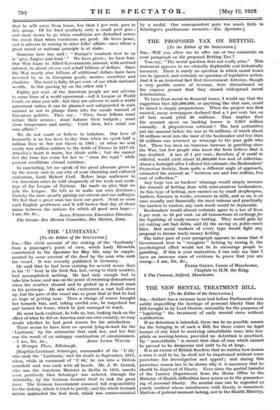THE LUSITANIA.'
[To the Editor of the SPECTATOR.] SIR,—The vivid account of the sinking of the Lusitania ' from a passenger's point of view, which Lady Rhondda contributed to the Spectator for May 5th, may be supple- mented by some account of the deed by the man who sank the vessel. It was recently published in Germany.
He said that he had been cruising for several weary days in his ' U ' boat in the Irish Sea, but, owing to thick weather, had accomplished nothing. He had only enough fuel to take him home, and was on the point of returning disheartened when the weather cleared and he picked up a distant mast in his periscope. lie saw with excitement a vast hull show up, but the pace of the vessel was so great that at first he had no hope of getting near. Then a change of course brought her towards him, and, taking careful aim, he torpedoed her and turned for home, which he just managed to reach.
He went back exultant, he tells us, but, looking back on the effect of what he did on America and our own country, we may doubt whether he had good reason for his satisfaction. There seems to have been no special lying-in-wait for the Lusitania ' by the submarine that sank her, and her fate was the result of an unhappy combination of circumstances.
—I am, Sir, &c., JOHN JAMES WAUGH. 4 Wernyss Place, Edinburgh.
[Kapitiin-Leutnant Schwieger, commander of the ' U 20,' who sank the Lusitania,' met his death in September, 1917, when, while in command of U 88,' he ran into a British minefield and was sunk with all hands. Mr. J. W. Gerard, who was the American Minister in Berlin in 1915, asserts most positively that Schwieger was ordered, through the Admiralty, by the German General Staff to sink the great liner. The German Government assumed full responsibility for the sinking, which it tried to justify, and the whole German nation applauded the foul deed, which was commemorated by a medal. Our correspondent puts too much faith in Schwieger's posthumous memoirs.—En. Spectator.]


















































 Previous page
Previous page